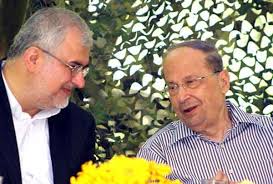Can Aoun avoid clashing with Hezbollah?
Michael Young/The Daily Star/February 04/16
If there were doubts about Hezbollah’s true intentions with regard to Michel Aoun, they were dispelled last week by Sayyed Hasan Nasrallah in his speech on the presidency. When one went to the heart of what Nasrallah said, the message was clear: We support Aoun but will not ensure that he has a majority in Parliament. What is remarkable is that some Aounists, still blinded by their association with Hezbollah, failed to see this. They refused to grasp that on the cusp of an Aoun victory, Hezbollah effectively said that Aoun was on his own – even if the party cushioned the blow with empty words about its “ethical” backing for the general.
At the center of the conundrum for Aoun is Nabih Berri. If Hezbollah persuades its allies and Berri to go along with Aoun’s election, something the speaker of Parliament dreads, the general will enjoy an absolute majority in a second round of elections. More important, Berri’s declaring for Aoun would oblige Sleiman Frangieh to withdraw from the race, because he does not enjoy a two-thirds majority allowing him to be elected in the first round.
Frangieh’s pulling out would also set in motion dynamics favoring Aoun, allowing those who supported a Frangieh candidacy to shift their votes elsewhere. Yet as Nasrallah said, Hezbollah will not push its allies to vote in a particular way, effectively blocking Aoun’s election. And unless Aoun is guaranteed of winning the presidency, his bloc will continue to boycott electoral sessions in Parliament, which means Lebanon remains without a president.
An election would serve to fill the political vacuum, which Hezbollah evidently doesn’t want. In other words the party that has extended the presidential void in Lebanon for almost two years in an effort to bring Michel Aoun to office, will now do nothing to guarantee that outcome by convincing its allies to vote for Aoun. How odd that Hezbollah now says it will not force Berri to vote for Aoun, when the party forced Berri to boycott Parliament in order, allegedly, to ensure Aoun’s election.
This confirms Samir Geagea’s prediction that Hezbollah would not back Aoun, even after the Lebanese Forces did so. But can things remain as they are? Aoun has never hesitated to rock the boat in pursuit of his presidential ambitions, and unlike his undiscerning followers he must be angry that Hezbollah will not help him.
What are Aoun’s options? He is unlikely to threaten a divorce from Hezbollah at this stage, when all it would serve is to perpetuate the deadlock. Rather, the general will, first, have to take the measure of what his eventual electors want, above all Berri. The speaker understandably is worried that Aoun might back an alternative for the speakership of Parliament, and wants guarantees on that front. Berri has a list of other demands as well, something no less true of Hezbollah, which was doubtless displeased with the list of conditions that Aoun agreed with Geagea when the Aounists and Lebanese Forces reached their understanding last year. Above all, the party seeks assurances that Aoun will legitimize their autonomous weapons arsenal and “resistance role” if elected.
This process could take several weeks, and Aoun has reportedly said to people that he does not expect his election to take place before March. That may be optimistic, but it indicates that the general sees the interval ahead as a time for bargaining.
During this period both Aoun and Geagea will raise the heat by exploiting Christian solidarity and frustration. They will affirm that Lebanon’s Muslim leaders and parties are happy only when the Maronites are divided, as it allows them to pursue their own political agendas. The presidential void, they will argue, is undermining Maronite interests amid indifference from the Muslims. Now that the leading Maronite parties have united around Aoun, there is no excuse for blocking an election, not when Aoun arguably enjoys the backing of most Christians.
That will be their contention, more or less. Already the Aounists are turning their guns on Berri and his ministers. In a statement by the Change and Reform bloc on Tuesday, the bloc accused the speaker and his ministers of marginalizing Christians in appointments at the Finance Ministry and the General Directorate of State Security. They warned that popular protests might ensue.
Can the tactic work? If it is part of a bargaining game, perhaps portraying Berri as a sectarian leader who is out to sideline the Christians might soften him up. But Aoun knows two things: in the best of circumstances Berri will not budge unless he gets what he wants, and more; and for now Hezbollah will not make him budge. That is why the key to cutting the Gordian knot remains Hezbollah.
If Aoun sees that all avenues to the presidency are closed, it is hardly implausible that he will turn to his relationship with Hezbollah and put that on the line. Either the party will have to support him without reserve, or else the relationship between the Aounists and Hezbollah will suffer, Aoun could say. This is not the general’s preference, but it will be his final bullet, at a time when he believes that Hezbollah needs a Christian partner in Lebanon to take advantage of the fact that the political balance in the region is turning to its advantage. Only such a partner would allow the party to better anchor its gains in the Lebanese political system.
Is this a certitude? Aoun will have to calculate the costs and benefits. But Hezbollah’s primary importance to the general was always its ability to help bring him to Baabda. If it refuses to do so, Aoun will have to wonder what he gained from opposing the majority all these years and isolating himself politically. Only by showing Hezbollah what it risks losing by abandoning him might Aoun still have a chance of finally winning the ultimate prize.
Michael Young is opinion editor of THE DAILY STAR. He tweets @BeirutCalling.



















